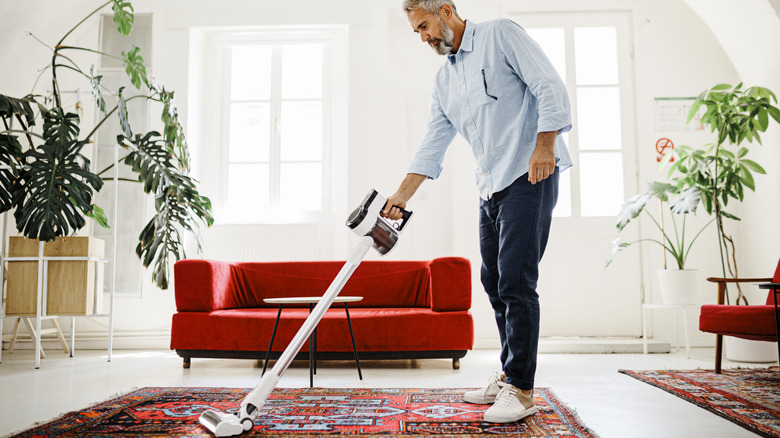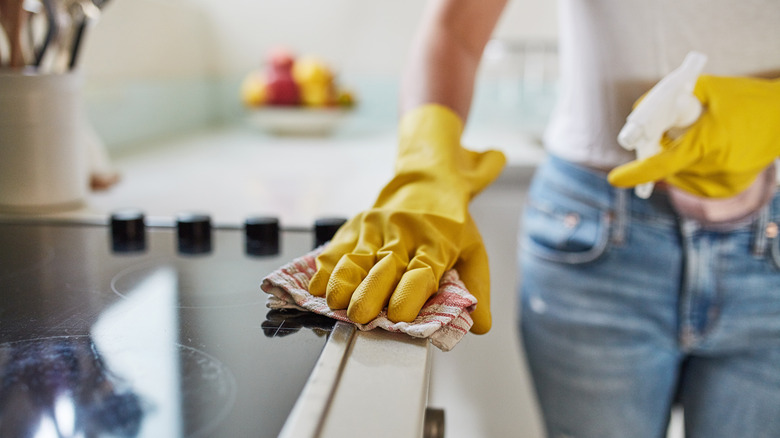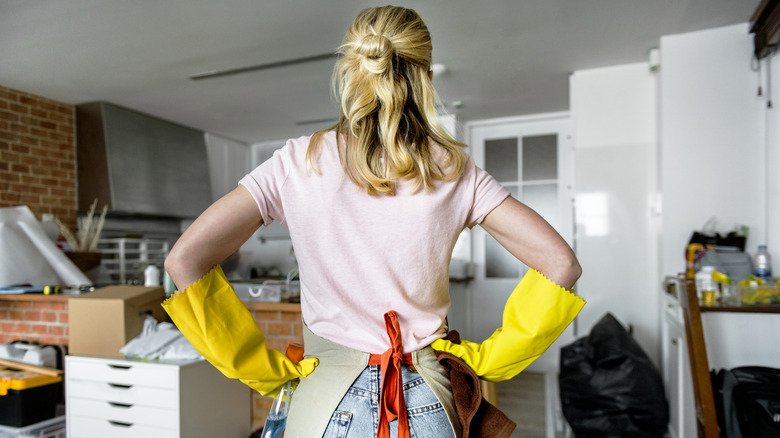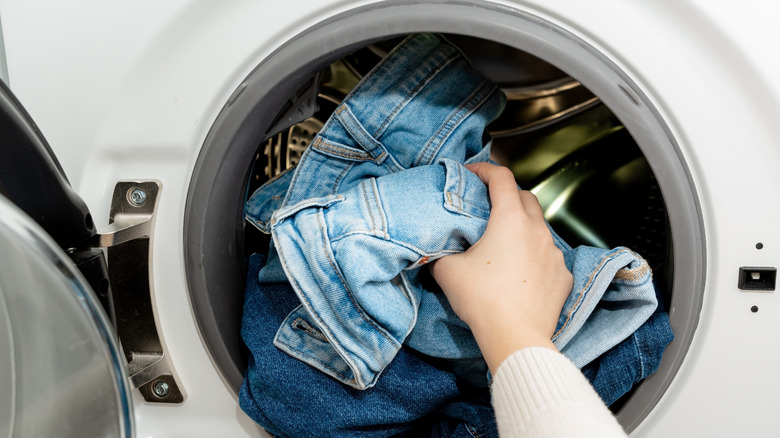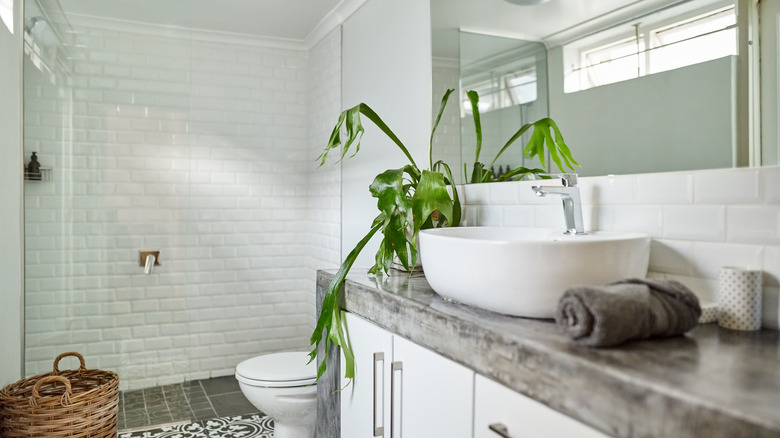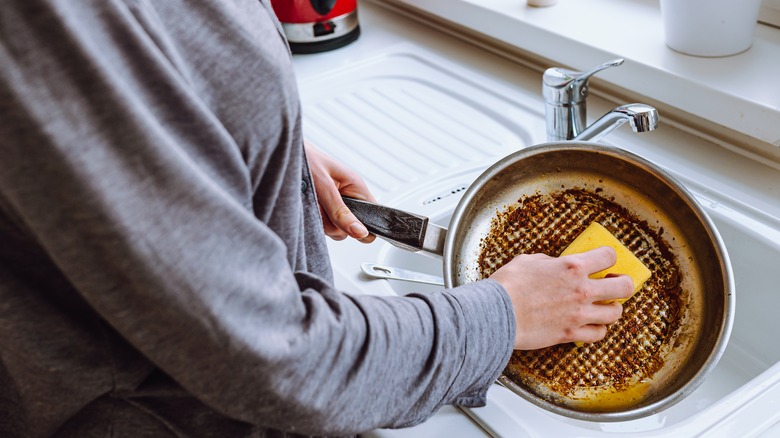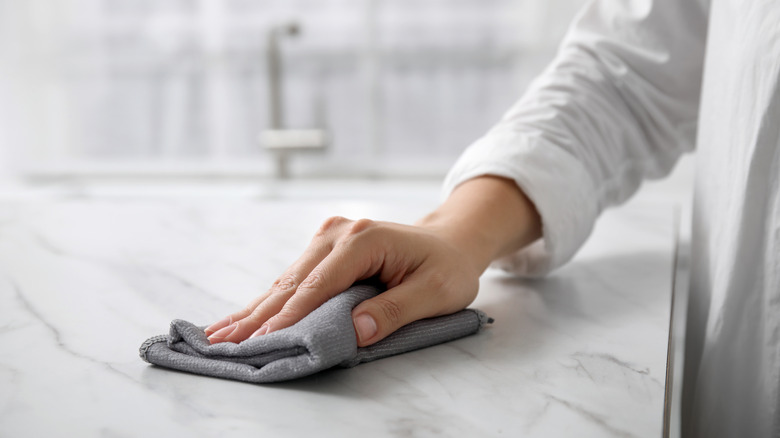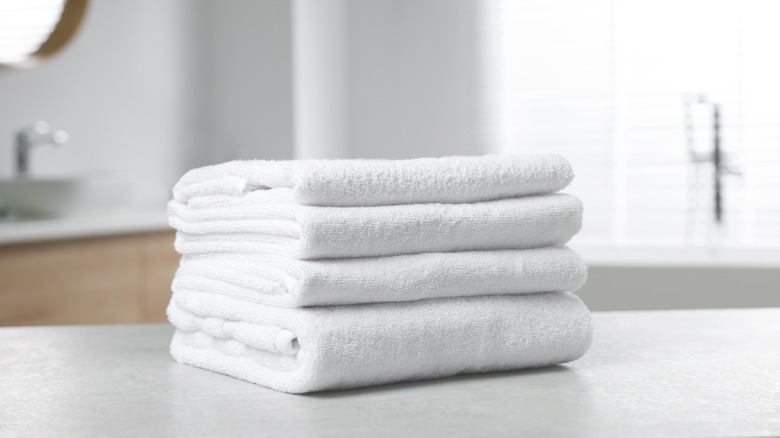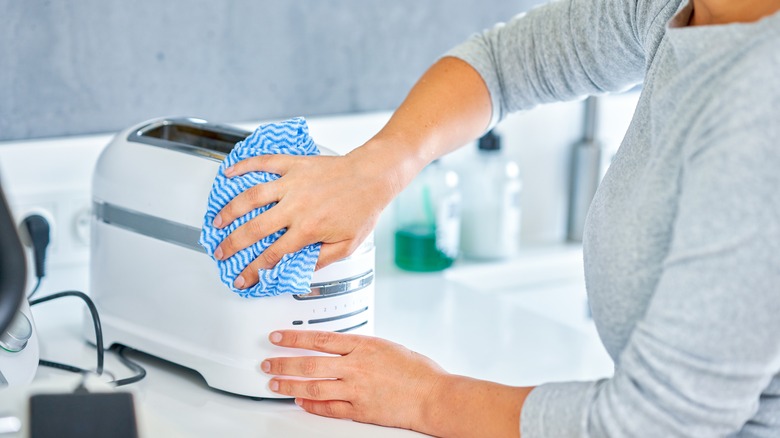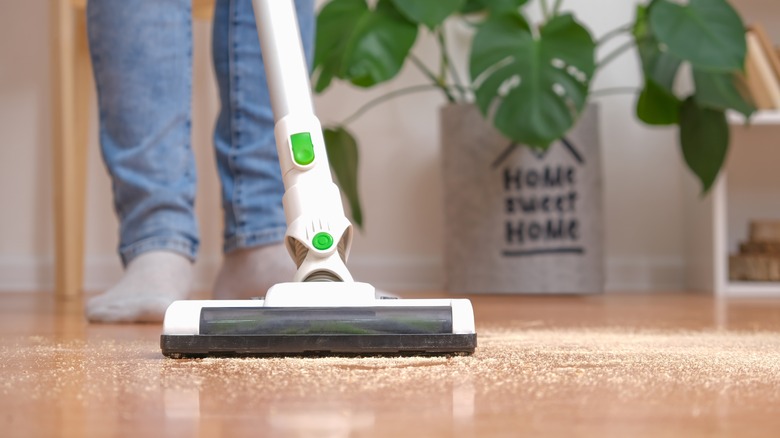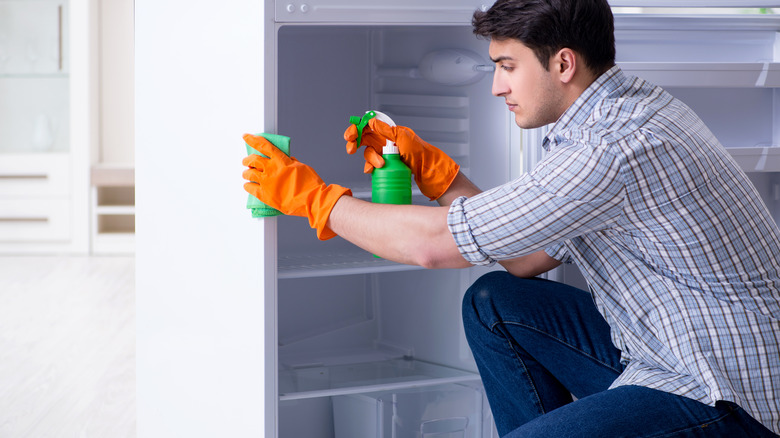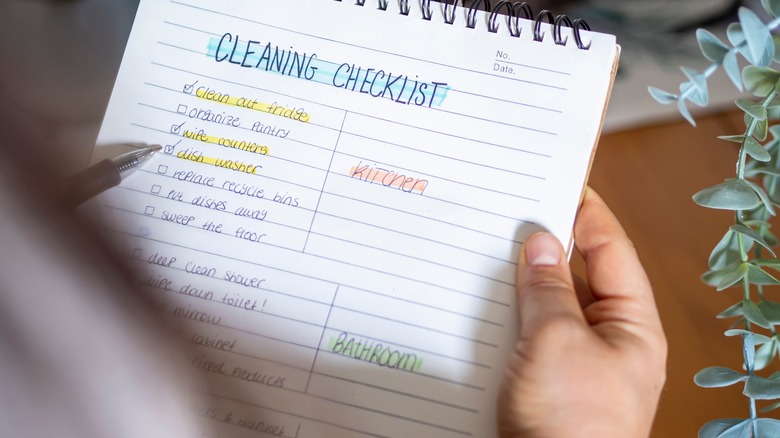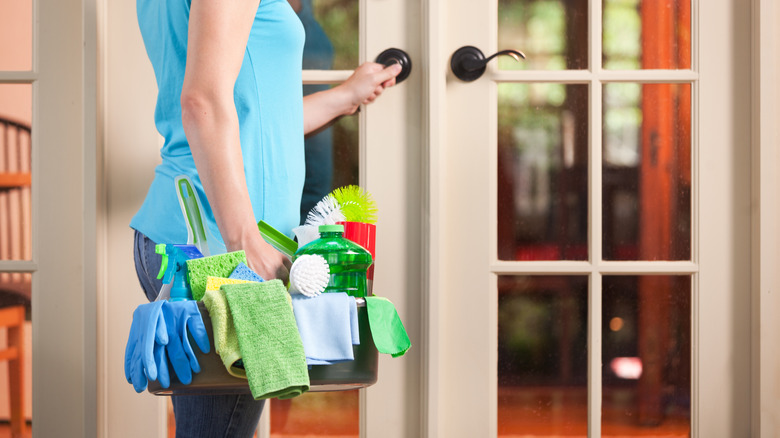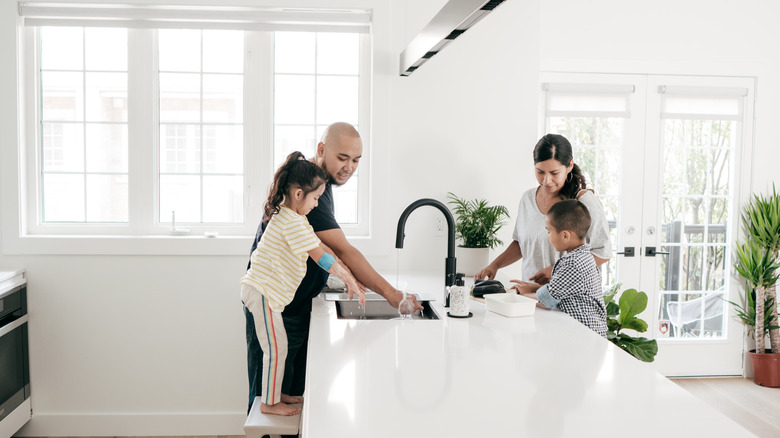14 Easy Cleaning Habits You Need To Adopt For A Spotless Home In 2024
We may receive a commission on purchases made from links.
Constant mess causing you stress? You're not alone. Survey results from Angi show that three out of five Americans get stressed when things aren't clean and straight. On the flip side, almost nothing can beat the peaceful atmosphere of a clean home, but keeping your space spotless can sometimes feel virtually impossible. In the blink of an eye, the dishes have piled up, the laundry basket is overflowing (again), the floors look like they haven't seen a broom in weeks, and the thought of guests wanting to use the bathroom triggers a mild sense of panic.
House chores can get overwhelming fast, and busy schedules don't help. The more you have on your plate, the more staying on top of cleaning can start to feel out of reach. If you do make a strong effort to reign in the dirt on a regular basis, it can begin to feel like cleaning is consuming your free time, and even then, you might never seem to keep up. What gives? Turns out, the secret to staying on top of cleaning chores lies in creating the right habits. Effective cleaning isn't just about the hours spent — it's about the habitual way you operate in your home. And what better time to start stacking new habits than at the beginning of a fresh year? Keep reading, and make 2024 the year you crack the code to a gleaming home.
Looking for micro-cleaning moments
One of the biggest barriers to having a consistently clean home is time. If you have a jam-packed schedule, where are you going to find the hours and energy to clean your home from top to bottom? If you don't have days to dedicate, start leveraging the power of micro-cleaning. Look for moments during the week when you can quickly complete a small cleaning task. This could look like sweeping the kitchen floor while you wait for the kettle to boil. Or, quickly wiping down the bathroom mirror while you let a face mask work its magic. If you can consistently carve out these micro-cleaning slots, this will quickly add up to a fresher space, equaling less overwhelm and less time you have to block out for big housework sessions.
If you're wondering how to get started, here are a few tips. When you feel the urge to check your phone while waiting for something on the stove, instead of scrolling social media, set a five-minute timer. See what small chores you can tackle in the kitchen until the alarm goes off. Before you know it, the dishwasher might be unloaded and the backsplash wiped down. Waiting for a family member to get ready so you can leave the house? Seize the moment to shake out the front mat or give your entryway a super-fast sweep. Micro-cleaning moments can even extend to your car. Have you got some sanitizer wipes in your glove compartment? If you're waiting in the car, give the dash a quick wipe.
Taking a bite-sized approach to mammoth cleaning tasks
The bigger a cleaning task gets, the more time you have to sacrifice and the harder it becomes to fit it in. If you can bite off chunks from larger cleaning jobs, they'll become less daunting and more achievable to tackle when you do have a free hour or two. Is your kitchen itching for a deep clean? Instead of allowing this job to steal half your weekend, see if you can divide it into smaller, more manageable tasks. If you want to clean smarter, not harder, start at the top. Devote a spare hour to wipe down the tops of cabinets and clean the range hood. On another day, tackle the insides of the cabinets in achievable stages. Finally, devote thirty minutes to scrubbing out the oven. Instead of leaving you exhausted and irritated that your weekend was consumed by cleaning the kitchen, this approach makes it possible to fit even more formidable cleaning jobs around the rest of your schedule.
If your bathroom is in dire need of attention, divide up the work across a few days by sections, such as the shower, walls, vanity, toilet, and floor. Worried that you're going to lose focus if you don't tackle everything in one go? List out the areas so you can track your progress and get the satisfaction of ticking them off. If you want to spring clean your whole home, you can also take a room-by-room approach, starting with the simplest area to gain momentum. Once you've dusted and vacuumed the spare bedroom, tackling the primary bathroom might not feel like so much of a slog.
A load a day keeps the piles away
An overflowing laundry hamper is never a nice sight. It means that a) you're probably missing your favorite socks, and b) you're going to have to devote a day to the exciting task of washing, drying, and folding a million loads of laundry. If you want to wave goodbye to laundry day, make it a habit to check your hamper every morning. If there are enough dirty items for a load, do one. Folding and stowing a single load of clothes shouldn't take you more than 20 minutes, even if you're avidly practicing file folding. Spending less than half an hour keeping the level down on the laundry hamper is a far more attractive prospect than washing and folding a mini Mt. Everest of clothes on the weekend. It also makes it more likely that you will actually fold the clean items. The bigger the pile, the more chance of it staying in a heap gathering creases.
Not sure you'll remember to check the hamper every day? One way to force yourself into the habit of frequent, semi-daily loads is to switch to a smaller laundry basket. You might also want to place your hamper in a prominent position where you'll be sure to see it at the start of the day. Finally, leverage the power of habit stacking by linking laundry loads to other elements of your routine, such as making coffee in the morning.
If you have a small household, semi-daily loads might be overkill, in which case you could allocate a dedicated day for washing. But you'd be surprised at how much laundry there is if you start looking for it. Checking for dirty items might mean that bedding, bath mats, and towels get washed more frequently. You might even get around to washing often-forgotten items like throw blankets, curtains, and cushion covers.
Wiping down your tub and shower right after use
According to the survey done by Angi, the bathroom is the most hated zone of the home when it comes to cleaning. If you detest scrubbing out the tub with a passion, this habit is for you. Instead of watching the scum and water stains develop, get into the groove of giving your shower or tub a quick wipe-down before you get out. Doing this every day might sound like more work, but it can save you a lot of time and muscle power. Wiping away the excess water will stop mildew stains from developing and keep your shower looking like new, sans super-long scrubbing sessions.
To make things convenient for yourself, take this tip to the next level by keeping a dishwand filled with your favorite cleaning solution stowed in the bathroom. Got a glass shower door? You might also want to invest in a shower door squeegee that will wipe away the water in one easy sweep.
Dealing with dirty dishes as you create them
Angi's survey also revealed that dirty dishes rank high as one of the biggest causes of mess-related stress. If a sink full of dishes is spiking your cortisol on the daily, adopting this habit can be game changing. Instead of letting the dishes accumulate and then dealing with them as a dedicated "chore," handle them straight away. If you dirty a spoon while cooking, pop it in the dishwasher instead of first stowing it in the sink or leaving it on the counter. The same applies to handwashing. Handling dishes as they happen is a form of cleaning on the go that can keep your kitchen surfaces clear and your sink ready for action at all times.
Do you wash all of your dishes by hand and are in the habit of turning off your water heater to save energy? If so, you might be faced with the fact that you don't have hot water coming out of the faucet every time you've got a greasy spoon to wash. Instead of resigning yourself to piles of dishes and big washing sessions, look for a dish soap that is effective in cold water as well as hot. Such an example is the No Tox Life Dish Block, which you can get for $14 on Amazon.
Wiping down counters after use
Nothing makes a kitchen look messier faster than dirty countertops. Add a couple of greasy pots, and getting things straight can feel like a big job that's best left until morning. The easiest way to keep your kitchen feeling clean, fresh, and inviting is by wiping down the counters after each meal. Even better, cultivate the habit of wiping away spills and crumbs as they happen. Not only will this keep your counters gleaming, but it will also save you time. Spilled food that's left to harden is tougher to wipe away later. Neglected crumbs will quickly make their way onto the floor and get underfoot.
All you need is a damp sponge and a drop of dish soap. If you keep your dish soap under the sink, consider decanting some into an attractive dispenser that you can keep next to the faucet. If you have to get the bottle out each time you want to wipe a spill or wash a spoon, this little bit of extra friction could derail your new habit.
Using dirty bath towels as a barometer
Bathrooms have a sneaky habit of getting silently out of hand. Before you know it, the vanity's gotten grimy and the mirror is covered in watermarks. If you hate the feeling of a suddenly dirty bathroom, use your towels as a cue to clean. Bath towels are one of the first things to look (and feel) grubby, and once they're ready for the wash, there's a good chance the rest of your WC is less than fresh as well. So next time you throw your towels in the washer, see what else needs attending to. Maybe the taps need a scrub, the vanity fronts are due for a wipe-down, or the area behind the toilet requires some attention.
Ideally, you should be switching out your towels every three days. If you swap your towels out this regularly, marrying the act to a bathroom speed clean might mean you only have to tackle one or two areas to get things gleaming. Checking off a couple of items every few days can help you avoid the dreaded three-hour battle to get your bathroom in tip-top shape.
Cleaning small appliances before putting them away
It's astonishing how quickly appliances like immersion blenders, bread machines, and waffle makers can accumulate grime. From sticky spots on their housing to grayish residue in the crevices of the cord and plug, there's almost nothing nastier. One of the reasons why these kitchen aids can turn into dirt traps is that they usually don't have a place in one's regular cleaning routine. Hauling out all your small appliances and going at them with a toothbrush isn't anybody's idea of fun. So, instead, take the clean-as-you-go approach. When you are done with a smaller appliance, cast a critical eye over it and see if it's in need of cleaning. You might need to spend a few minutes lifting stubborn dirt, or you may be able to simply give it a quick wipe with a damp cloth before packing it back.
You can also use this strategy for appliances that are usually left on the counter, like your coffee machine or toaster. When you're done making toast, toss out those crumbs and wipe away any finger marks. When disposing of old coffee grounds, give your machine a quick shine. In the beginning, this approach might require a little extra time. But if you make it a habit to keep your appliances looking spiffy, you can avoid tiresome de-griming sessions down the road.
Adopting a daily vacuuming practice
Whether you love to walk barefoot or simply can't stand the sight of a floor dotted with dirt, crumbs, and cat hair, here's the solution: daily vacuuming or sweeping. Vacuuming every day does not mean you have to do the whole house. Simply focus on the most critical areas, like the kitchen, high-traffic zones, or area rugs that tend to trap dirt.
The secret to keeping up with daily vacuuming or sweeping is to make it as convenient and friction-free as possible. If you have to lug a behemoth vacuum out of the basement every time, this is probably going to sabotage your new habit. If your budget allows, look into cordless models like the much-loved Dyson vacuum cleaner. Not having to battle cords, wield pipes, and pull around the drum and motor can turn vacuuming from a highly irritating activity into something approaching pleasure. If you prefer sweeping, invest in a couple of extra brooms and stow them in handy spots, ready to be whipped out when you have a few moments to sweep an area. If bending down to brush dirt into a pan is not your jam, you can also consider buying an electric broom. And if you want to put cleaning floors on autopilot, a robot vacuum could be the perfect solution.
Having a strategy for your refrigerator
Crisply clean, organized refrigerators aren't an aspirational impossibility that lives entirely on Instagram. They can be a reality — all you need is a game plan. Most households only have to do refrigerator deep cleaning every 3-4 months. But in between these sprees, you can keep things spiffy with some maintenance cleaning. Start with a clean-as-you-go approach and practice wiping up spills and spots of sauce as you see them on the shelves. Get into the habit of cleaning the outside of sticky jars and containers before putting them back. Grocery day is the perfect time to go through your fridge, check expiration dates, and toss uneaten leftovers. You don't have to do serious scrubbing, but you might want to quickly wipe out the drawers with a paper towel and address any obvious dirt buildup.
Speaking of grocery hauls, be careful not to overload your fridge. If the shelves are jam-packed, it will be harder to see what you have, access items, and clean up spills. Finally, keeping your fridge clean isn't just a matter of food safety; it can also be good for the motor. Having too many items on a shelf can block the air vents, which will cause the motor to work harder to pump enough cold air into the box. To take care of the motor, establish the habit of cleaning the grille with a vacuum brush attachment every six months. This will remove any accumulated dust that might be choking airflow to the compressor and condenser.
Creating a cleaning schedule
Unless you naturally have a Type-A personality, keeping up with cleaning jobs can quickly fall to the back burner. If you struggle to prioritize housework, consider creating a cleaning schedule. Having a set schedule can help you plan out time slots for tasks and reduce mental overwhelm. Cleaning schedules can also make it easier to get others involved, assign tasks to family members, and help you solidify the habit of cleaning less but more frequently to prevent chore backlogs.
There are multiple structures you can try out –- the trick lies in finding one that suits your household and personality. You can take the one-room-a-day approach, where you dedicate a set amount of time to completely clean one area of your home. You can also take the single-task approach, where you focus on one thing per day, such as dusting surfaces, cleaning windows, or tackling floors. If neither of these is practical, simply list out all the tasks you want to do daily, weekly, and monthly and block out time to tackle them. Create a checklist for each day so you can stay focused (no sorting photo albums in the garage if it's not on the list). Being able to tick off tasks will also give you a sense of accomplishment and trigger dopamine release.
Leveraging home cleaning apps
Not a fan of manually drawing up cleaning schedules and to-do lists? Like for most things these days, there's an app for that. Or rather, multiple apps! Get into the habit of using cleaning apps that allow you to list, tick off, and track tasks from one centralized place. Instead of misplacing your list or having to draw up new ones every week, apps like Cleaning Checklist allow you to receive reminders and easily share task lists with family members. The Spotless app will even track all of your completed chores, so you can see at a glance when last you wiped the ceiling fan blades or defrosted the freezer. Tody offers similar features while aiming to gamify home cleaning with encouraging notifications and opportunities to claim credits.
Sweepy could be perfect if planning isn't your forte and you want to take the decision-making out of cleaning. Simply input the amount of time you want to devote to chores per day, and the app will feed you a selection of tasks. And if cleaning isn't the only area you want to create great habits around, check out DONE, the app that helps you build better habits and train yourself out of bad ones.
Using a cleaning caddy
If you want to be able to clean as you go, sanitize on the fly, and quickly combat grime between other tasks, you need to have a grab-and-go cleaning arsenal. The answer? A fully-kitted cleaning caddy. With a well-stocked cleaning caddy at your fingertips, you'll be able to tackle that greasy oven, clean a sliding door, or wipe down surfaces at a moment's notice. If you have to dig around for the right supplies, this could eat into your window of time and prevent you from even starting the task.
Pick a cleaning caddy that's big enough to hold all the essentials but not so big that it's bulky and awkward to carry around. Also, adopt a minimalist mindset around cleaning products. You definitely don't need a cupboard full of specialty cleaners. Skip the hyped-up products that aren't worth buying and stick to a few core cleaners that are hard on dirt and light on your wallet. Focus on filling your caddy with a good selection of cloths, sponges, and brushes, so you can attack anything from stained grout to grubby taps in the blink of an eye. To bust dust like nobody's business, pick up a compact yet extendable Swiffer microfiber duster. If you don't want to carry a caddy around, a heavy-duty cleaning apron with generous, well-designed pockets can be a great alternative.
Enlisting help
No matter how organized you are, cleaning a whole house on your own can get tiring, challenging, and disheartening. Unless you're surrounded by Type-A personalities, help probably isn't going to come raining in from all sides. But this doesn't mean you shouldn't ask for it. Unfortunately, a lot of us leave asking for help until we're exhausted, overloaded, and irritated. None of these states are conducive to great communication, and all too often requests for a helping hand come out as angry attacks. Instead of letting things reach this point, get into the habit of being proactive and gathering your recruits when your battery is charged and your mood is light. Map out who's going to tackle what and when, allow for discussion, and let your inner delegator shine. If you can keep the vibes positive, there's a bigger chance family and roommates will happily pitch in.
If you have a sneaky feeling that forgetfulness is going to sabotage initial good intentions, get your helpers to download one of the cleaning apps listed above so you can collaborate on completing chores. Finally, don't dismiss hiring help. Paying for a cleaning service regularly might not fit into most people's budgets, but there might be times when having a professional cleaning company come in can be a must. For instance, if housemates aren't willing to help, suggest splitting the cost of professional services. If you're ill, overloaded to the point of burnout, or just need a break, paying for a once-off deep clean can be well worth it.

